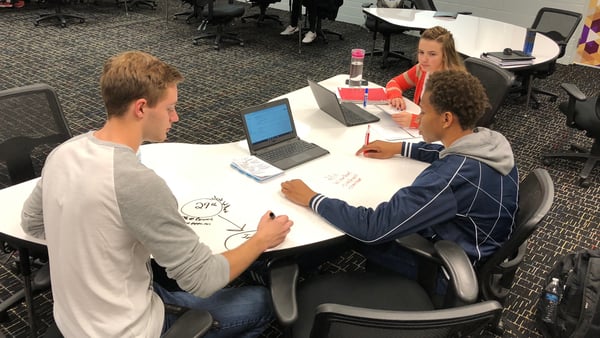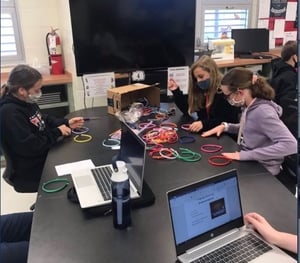Over the past decade in the field of experiential learning, I’ve heard the same question come up in collegiate and K-12 education circles, over and over again:
Experiential learning is awesome, but how am I supposed to grade an experience?.jpg?width=217&name=Ashley%20Blackburn%20(2).jpg) How Do You Grade an Experience?
How Do You Grade an Experience?
Maybe this question is keeping others of you up at night or causing you to avoid eye contact with your assessment coordinators at your next institute day, so I’ll share the response I’ve developed over the years in addressing this exact issue:
When designing an experiential program, the goal isn’t to score or rate the student on their experience - it’s to evaluate student learning.
This can be an admittedly messy process, especially when we know through years of observation that students are growing and developing in complex ways. As teachers, often, the seeds we plant in our classes don’t actually take root until many years later - especially in an entrepreneurship class curriculum. I get that this stuff can be challenging, overwhelming, and intimidating. Development of entrepreneurial mindset and 21st century skills like problem solving, creativity, collaboration, and critical thinking can be difficult to authentically assess without a robust, longitudinal assessment strategy that goes beyond self-reported metrics—but that doesn’t mean we shouldn’t start with what we can do now. I always come back to, 'What do we truly care about knowing?' And in turn, 'what can we measure?'.
Measuring and Tracking
If we take our high school entrepreneurship curriculum, INCubatoredu, as an example of how we might tackle this challenge, here’s the sweet spot between what we care about knowing and what we can measure or track with readily available and observable data:
- Are students, teachers, and communities actively participating and engaging in the program?
- Are young, aspiring entrepreneurs achieving their goals to secure funding or launch their ventures?
- Are INCubatoredu students succeeding, personally and academically, in their goals and leadership pursuits?
Our schools are well positioned to answer these questions, and other questions specific to their own district priorities, because of how the INCubatoredu entrepreneurship class curriculum is designed. All Uncharted Learning programs are designed to be experiential, both in what students do and how they’re assessed.
 In an experiential curriculum, students learn by processing and applying new concepts and knowledge to real problems and initiatives of their own design. Measuring the skills, mindsets, and behaviors gained through entrepreneurship experiences presents an opportunity to utilize performance-based metrics that align with experiential learning methodology, since performance assessment requires students to do or create something that can be measured against a specific set of criteria.
In an experiential curriculum, students learn by processing and applying new concepts and knowledge to real problems and initiatives of their own design. Measuring the skills, mindsets, and behaviors gained through entrepreneurship experiences presents an opportunity to utilize performance-based metrics that align with experiential learning methodology, since performance assessment requires students to do or create something that can be measured against a specific set of criteria.
 Just as students learn by doing, educators can assess that learning through direct observation and documentation of students’ performance and products. Evaluating success in an experiential curriculum should go beyond self-reported measures to capture student reflections, peer evaluations, teacher observations, and external stakeholder feedback from community volunteers - ultimately providing a robust, holistic, 360° view of student growth and development. This is exactly what we provide in our high school entrepreneurship class curriculum through our share-back framework, rubrics, peer and mentor assessment, and robust feedback loops embedded throughout the learning experience.
Just as students learn by doing, educators can assess that learning through direct observation and documentation of students’ performance and products. Evaluating success in an experiential curriculum should go beyond self-reported measures to capture student reflections, peer evaluations, teacher observations, and external stakeholder feedback from community volunteers - ultimately providing a robust, holistic, 360° view of student growth and development. This is exactly what we provide in our high school entrepreneurship class curriculum through our share-back framework, rubrics, peer and mentor assessment, and robust feedback loops embedded throughout the learning experience.
Guiding you through the process
To further support Uncharted educators in the process of evaluating their entrepreneurship class curriculum, we developed the following guide on defining success and measuring impact. This resource is designed to guide districts, schools, and teachers through the process of determining their own success criteria, and identifying ways to measure against their definition of success. Just as we promote student agency, choice, and voice - we also believe districts should be the drivers of their own success.
Our Curriculum & Instruction Team is composed of passionate, imaginative, experienced K-12 and collegiate educators, and is here to support the educational mission of all of member schools. We’re excited to share this guide on defining success and measuring impact, and we look forward to rallying around your evaluation efforts however we can.
What do you think of this point of view? We'd love to hear from you!
"Everything that they're learning in entrepreneurship are skills for life. So when we just look at that, students are ready for the world beyond our classroom when they leave us."
~Dr. Kamela Patton, Superintendent at Collier County Public Schools
